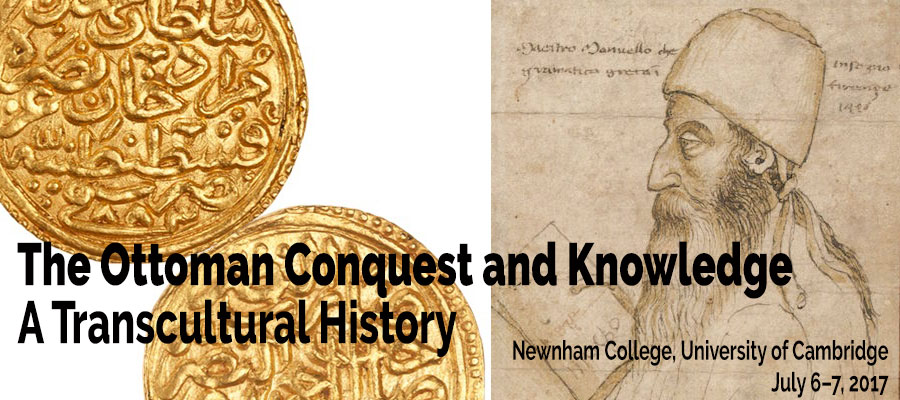The Ottoman Conquest and Knowledge: A Transcultural History, Newnham College, University of Cambridge, July 6–7, 2017
This conference focuses on networks, production, and transmission of knowledge during the Ottoman conquest of the eastern Mediterranean. The aim of this conference is to further our understanding of the ways in which knowledge was transformed, exchanged, diversified, expanded, and suppressed during the period beginning with the Ottoman conquest of the Eastern Mediterranean.
The conference and the intended publication, it is hoped, will make an important contribution to the growing body of research that challenges long-held assumptions, prejudices, and misconceptions that the Ottoman Conquest of Byzantium and former Byzantine lands signalled the beginning of a ‘Dark Age’ of the production and exchange of knowledge.
The conference is meant to cover a broad geographical and disciplinary field. Each panel will focus on a different geographical area, with chronologically ordered papers to cover both diverse regions–Europe, the Near East, the Balkans, North Africa, and Muscovy–and a large number of historical questions regarding the effects of the Ottoman Conquest on written culture, book-learning, and the production of knowledge.
The conference will engage substantially with questions concerning the mechanics of the transmission of knowledge: the transfer of books and texts from the Byzantine Empire to other parts of the world, the transformation of the built landscape, intermarriage and marriage alliances, exiles and refugees, and diplomatic exchange; and the production of knowledge: through cross-cultural exchange and dialogue, the production and recuperation of texts and written culture, the collection and recuperation of Byzantine learning and knowledge in the wake of the Ottoman Conquest, and the creation and function of networks of knowledge in the Eastern Mediterranean and beyond.
One of the major thematic strands examines intellectual exchange and the transmission of information through diplomatic, mercantile, and religious infrastructures that rose out of the Ottoman Conquest.
A second major thematic strand examines how cultural and religious tolerance developed out of the Ottoman Conquest based on knowledge exchange and transmission and why the early Ottoman Empire attracted rather than simply created immigrants. It is important to ensure a geographic diversity, so that the regional impact of knowledge expansion (or contraction) during the period and in the wake of the Ottoman Conquest is addressed. It is precisely for this reason that the geographic limits of the conference are not restricted to the lands that the Ottomans conquered, but include regions that were affected by the transmission, production, and exchange of knowledge that occurred during the period of the Ottoman Conquest of the Eastern Mediterranean. This is also why the chronological boundaries have been substantially enlarged to encompass the Ottoman Conquest from the 14th century and the Byzantine-Ottoman wars and period of Ottoman conquest to about 1566 and the consolidation of Ottoman rule, the rise of Muscovy, and the winding down of Ottoman expansion.
This geographical and chronological framework will ensure that the conference papers, and the planned publication, draw on diverse sources that are rarely treated in conjunction. Participants will include historians of the Byzantine Empire, the Medieval Mediterranean basin, the late Medieval Balkans, the early Ottoman Empire, the Medieval European States, and Muscovy.
Registration required.
